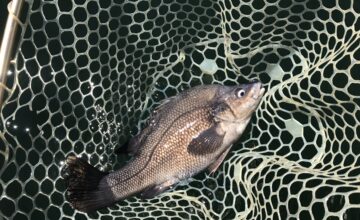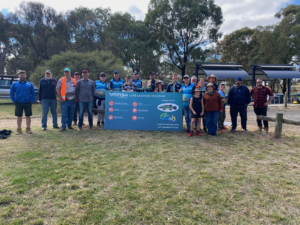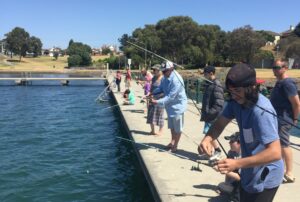October 20, 2015
By Renae Ayres, Arthur Rylah Institute
Ask a recreational fisher which fish species they most prefer to catch in rivers and common responses are Trout, Murray Cod, Estuary Perch . . . but what about the humble River Blackfish? In the Tarwin River Catchment in the past, River Blackfish were a very popular recreational fishing species. River Blackfish were found throughout fresh water areas of the entire Tarwin River Catchment and the region was one of the main fishing destinations for River Blackfish in Victoria. These days, the abundance of the River Blackfish in the Tarwin River Catchment has declined and its distribution is restricted. Leongatha Angling Club Inc. hold an annual River Blackfish fishing competition on opening weekend and report that their catches have waned over recent decades.

Rehabilitated habitat in a tributary of Tarwin River west branch; weeds have been removed, native trees replanted and fences erected
Healthy habitat is a key to improving fish populations (and your fishing opportunities!). Over the past 25 years, the West Gippsland Catchment Management Authority (WGCMA) together with local landholders and community members, have undertaken extensive waterway rehabilitation activities in the Tarwin River Catchment, including weed removal, native revegetation, fencing and bank stabilisation works. These works have rehabilitated habitat for River Blackfish and other fish species at a number of sites. However, the non-migratory nature, localised breeding strategy and small home range of River Blackfish may be limiting the natural recolonisation of these rehabilitated areas.
New research is commencing to investigate ways to help return the local River Blackfish population to its former glory. WGCMA, the Arthur Rylah Institute for Environmental Research (ARI) and local recreational fishers are working together on a pilot research project to trial the translocation of River Blackfish into rehabilitated habitat sites in the Tarwin River and investigate whether they establish new home ranges within the rehabilitated sites.
In October/November 2015, 30 adult River Blackfish (greater than 20 cm long) will be collected from source locations in the Tarwin River and moved to rehabilitated and non-rehabilitated reaches located downstream within the historical distribution of this species. The translocated River Blackfish will be implanted with acoustic tags (similar to microchips for your pets) so that we can monitor their movements. We hypothesise that the River Blackfish translocated into the rehabilitated habitat will stay within their new home range, whereas the River Blackfish translocated into the non-rehabilitated reach may move to find better habitat and possibly return to the source location. A series of acoustic receivers placed within the rehabilitated and non-rehabilitated sites, as well as between these sites and source sites, will log the details of tagged River Blackfish if they swim past. Data from the receivers will be downloaded regularly over the next 6 months to check whether the tagged River Blackfish are moving within or out of translocation sites and in which direction.
The project is in the early stages and final results will not be known until mid-2016. We kindly ask that recreational fishers safely release any tagged River Blackfish caught in the Tarwin River until after the project finishes. Learnings and outcomes from this trial translocation may be applied in the future to help re-establish local River Blackfish into rehabilitated habitat within their natural range in Victorian waterways. Many thanks thus far to Leongatha Angling Club for supporting the project and for suggesting locations to source River Blackfish.
This project is funded by the Victorian Government using Recreational Fishing Licence Fees. It is managed by WGCMA and ARI has been contracted by WGCMA to conduct the research. For further information, please contact Matt Bowler at WGCMA (phone: 1300 094 262) or Justin O’Connor at ARI (phone: (03) 9450 8600, email: justin.o’[email protected]).








